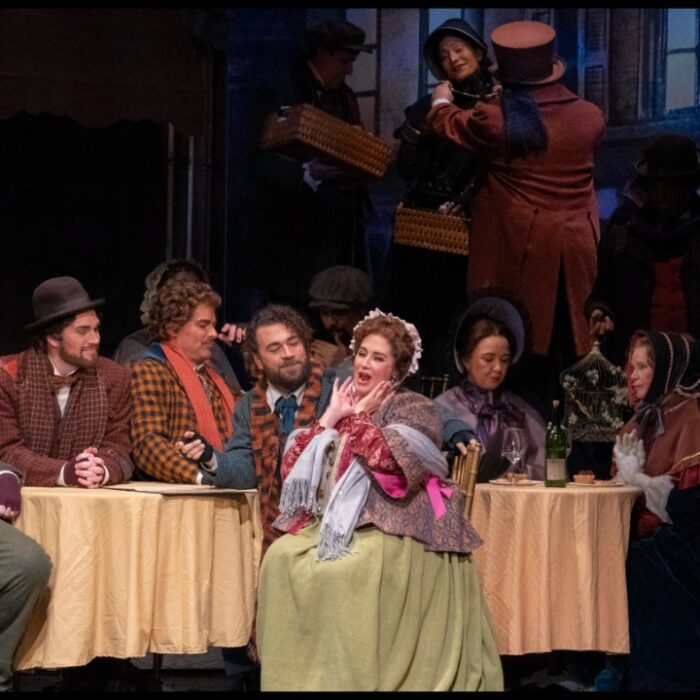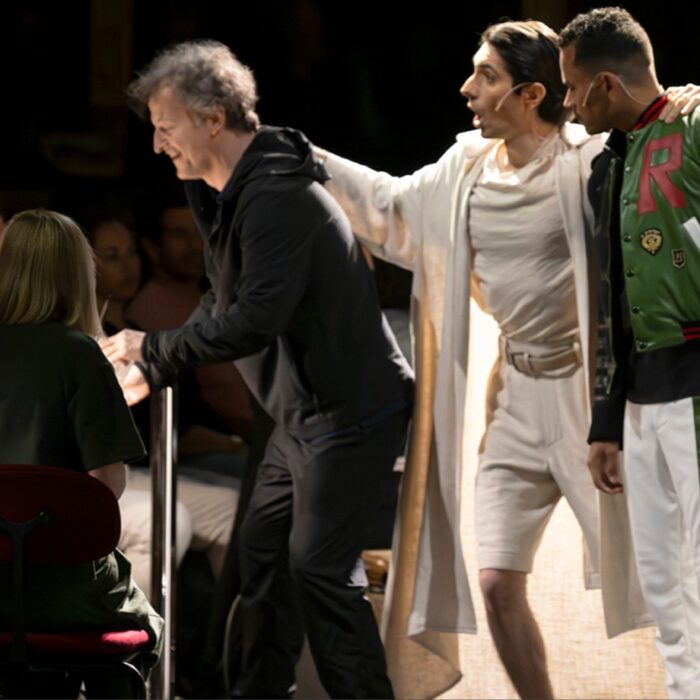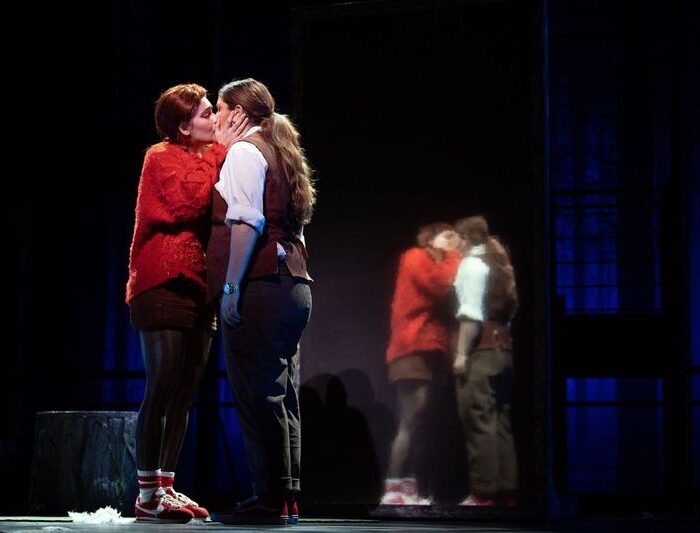
Bronx Opera / New York Opera Fest 2019 Review: The Mikado
Classic Work Takes On Trump Administration In Unique Reimagining
By Logan MartellSaturday, May 4, 2019, saw the third performance of Bronx Opera’s production of Gilbert and Sullivan’s “The Mikado.”
This cherished comedy featured a current-year setting, taking the fictitious city of Titipu and draping it in all the trappings and references of the Trump Administration. While initially uncertain as to how well the work’s themes, text, and music would translate to this new vision, what ensued was an evening of laughter supported by the solid musical sensibility of the cast.
Taking On Trump
Of the production, Bronx Opera General Director Ben Spierman writes: “When Gilbert and Sullivan wrote ‘The Mikado,’ they used Japanese imagery to distance their creation from the political satire that was embedded in the story. This imagery was superficially familiar to Londoners of the time, thanks to the presence of the Japanese Village, an exhibition in the Knightsbridge section of London. Over the years, this imagery became as (if not more) important than the satire and the characters in the piece. Our production takes this story away from the visual imagery, replacing it with images familiar to us from the news of today. We also refer to characters who are active in today’s socio-political world – some very directly, some more obliquely – while still (hopefully) honoring the brilliant worked bequeathed to us by Gilbert and Sullivan.”
In the role of Nanki-Poo, tenor Jonathan Price bore an often-humorous charm; as the son of the Mikado, this updated production cast the role as a mixture of Donald Jr. and Eric Trump, as seen from Price’s darker locks and rather-toothy smile.
His opening aria “A Wandering Minstrel I,” carried a welcoming brightness that did not seem to damper even as he recalled his own sad story, belying phrases such as “sympathetic tears my cheeks bedew.” This congeniality was highlighted by the ease of his B-flat, winning over the chorus of journalists and ending the aria with a group selfie.
While something of a straight-man for the characters to play off, Price’s Nanki-Poo was no stranger to absurdity. When deciding whether or not to reveal his royal identity to Yum-Yum, Price’s line “Should I tell her?” is directed away from himself and instead towards the bass player elevated above the rest of the orchestra. When resolving upon suicide over losing Yum-Yum’s hand in marriage, Price puts away the noose he was readying to hang himself with and instead opts, more shockingly, for downing a flask of “vintage Michigan water.”
As Yum-Yum, soprano Barbee Monk brought a vain and vivacious flair that often drew one’s attention and lent more agency to the character. Her duet with Nanki-Poo “Were you not to Ko-Ko plighted,” comically explored the social and legal boundaries that kept them apart as they teased each other with phrases such as “If only there not this big, beautiful border wall between us… like that,” and “gazing at each other through the slats… like that.” At its conclusion, their impending kiss is prevented as Monk pulls out her phone and is drawn away by some exciting news; Price, reasonably annoyed, also pulls out his cell phone and is quickly exits in the other direction. While this direction is rather ambiguous, one possible explanation is that the media they consume seemed to be shaping their perspectives and making them feel as if there is no chance for their love.
Rich Comedic Timing
A tremendous source of comedy came in the form of Pooh-Bah, played by the equally-tremendous Michael Blake O’Hearn. Eloquent of speech and florid in gestures, O’Hearn readily informed Nanki-Poo and the audience of his many roles and titles which reflect the modern vision, including “Chief of Staff, Treasurer, Bronx Borough President, and Leader of the Billy Bush Bus Tour.”
For his aria, “Young man, despair,” O’Hearn’s higher, more oily tone of voice, quickly vanished as he revealed a much fuller and deeper bass register, vocally emphasizing the shift in personality that comes with the character’s conflicting positions. Despite his later squeamishness around the group of schoolgirls, O’Hearn delivers a shocking line when he inquires to KoKo “What am I supposed to do with them? Take my oversized hands and grab them by the—“
On the physical side of comedy, O’Hearn’s bulk came into play as he slowly made his way about the stage at the request of KoKo, trying to secretly confer with each of Poo-Bah’s roles; later when the cast gathers to form a chorus line, O’Hearn gives up on trying to match their alternating kicks and casts a dismissive look at his more-nimble company.
As Ko-Ko, Sean Kroll brought a youthful, and often frantic, vitality to the role of the older guardian. His introductory number “Behold the Lord High Executioner,” saw him swarmed by the ensemble of journalists holding their phones to his face and recording his statements.
His following number “As some day it may happen,” became a highly-topical catalogue of his many political opponents, supported by a slideshow; this included Joe Biden, pictured while sniffing the hair of an adolescent girl; William Barr, referred to as a “faux attorney general;” and extending to Angry Birds players, fidget spinner enthusiasts, and even Nigerian email scammers. “They’d none of them be missed,” humorously punctuated Kroll. With Nanki-Poo and Yum-Yum, Kroll tearfully suggested they display their affections, while his pained reactions sent his body reeling in ways that threw himself between the lovers, nicely tying together his blatant conflict. When deciding how to break the news of Yum-Yum’s possible execution, Kroll turned to bassist Mark Wade, again at a loss for answers; moments later he confirmed these grim tidings, saying “I conferred with Pooh-Bah, he’s my Giuliani.”
With Erica Koehring’s Katisha, Kroll’s apprehensions and fears were expressed in full, responding to the prospect of marrying her with the now-distinctive phrase “She is a nasty woman!” Their interactions saw her looming over him with fury, indignation, and then longing as they took each other in marriage; their duet, “There is beauty in the bellow of the blast,” featured precise pattering as Koehring led Kroll about in a show of her control, first by the hips, and then by the hair. In the role of Katisha, Koehring’s fearsome figure soon melted away into a more nuanced and sympathetic character. Her bright red pantsuit all too reminiscent of a certain former first lady, Koehring wasted little time in exerting her perceived authority before being shut out by the stretta which concludes Act one.
The President Himself
As The Mikado himself, baritone Wil Kellerman deftly brought to life the character most changed by the present-day presentation of this work. All but a direct reference to President Donald Trump, this character was further blurred as a result of literal Russian influence, being the language his speech often slipped into, as well as the one he tweeted in.
His introductory aria “From every kind of man obedience I expect,” featured almost entirely-new lyrics which humorously reflected the character’s Russian flavor; the interjections from the attention-seeking Katisha, instead of favoring Trump or Putin, were one remainder of the Mikado’s original personality.
Bronx Opera’s production of “The Mikado” comes as a delightful start to 2019’s New York Opera Fest. Its modern re-imagining goes beyond the surface, adding unexpected laughs and surprises that can be enjoyed by most audiences, provided they have been following the political circus of social media enough to catch most of the references. While most of these hit their mark rather succinctly, there were a small handful which went over my head, and those of others I suspect. Given the polarizing effect politics tend to have on the public, Saturday night’s performance succeeded in bringing people together for an evening of musical comedy.


